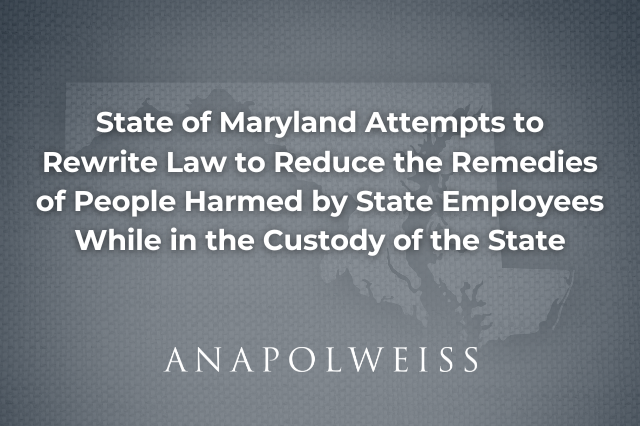
Issued by Legal Representatives, Including Anapol Weiss, of the 4,000 Plaintiffs
Background: Over 4,000 verified survivors of childhood sexual abuse who were victimized by state agents while they were in the custody of the state, through its juvenile detention centers, have come forward to share their trauma. In 2023, the state passed the Child Victims Act (CVA) to address the state’s liability for these abuses and capped damages at $890,000 per occurrence.
The State of Maryland is aware of the nature and extent of the abuse and acknowledged its responsibility to remedy these abuses when it passed the CVA. By way of the CVA, the State of Maryland explicitly acknowledged that claims against the state were viable by eliminating specific notice provisions normally required to proceed against the state.
Previous Challenge to the CVA: Non-state actors, in particular various religious entities, brought challenges to the constitutionality of the CVA. On February 4, 2025, the Maryland Supreme Court ruled that the CVA of 2023 was in-fact constitutional.
Challenges Occurring This Week: Now realizing the magnitude and culture of abuse that happened for decades on its watch, the State of Maryland has introduced HB 1378, which completely reverses course from what was intended by the CVA, limiting survivors’ civil recourse. Specifically, it would:
- Not only limit survivors’ recovery by more than half -- from $890,000 to $400,000 -- but also change a claimant’s recovery from a per occurrence basis to a per claimant basis.
This means that an individual who was raped 50 times is now limited to a recovery of $400,000, versus, notably, the fact that limits do not exist when a survivor is abused by someone other than the state. (Apparently, a child raped by a priest has more rights than a child raped by a state juvenile detention officer.)
- Cut off survivors’ abilities to file lawsuits by forcing them into an “Alternative Dispute Resolution Program,” where the state would control timing, method, and priority of cases. This eliminates the ability of survivors to have a jury trial and violates the constitutional right to a jury trial.
The State of Maryland has effectively told survivors who have lived with their trauma for years – and for some, decades – that Maryland’s promise to make them whole was one made with fingers crossed. Put simply, if these survivors had been abused by a private entity – the Catholic Church, for example – they would have had more rights than they do now as individuals who were abused by the State of Maryland.
The Ask: Survivors pursuing these claims are asking the Attorney General’s Office to follow through on the promises made to them by the Maryland Legislature and for the General Assembly to reject these proposed amendments.

